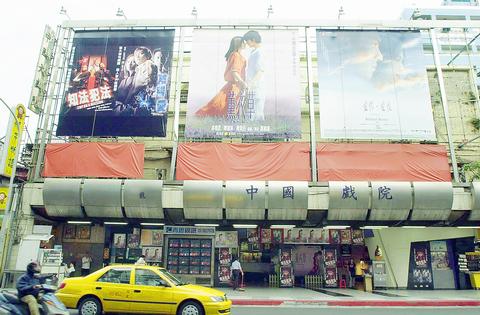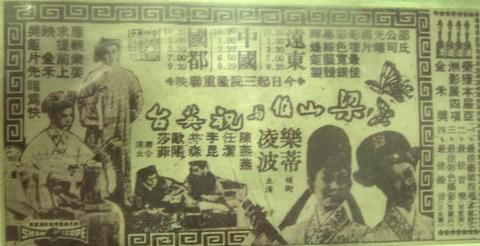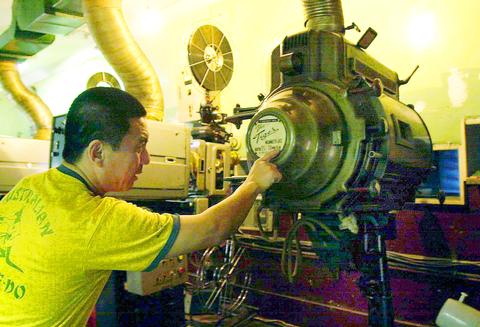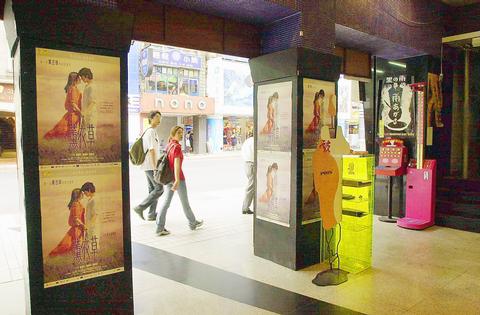Outside the China Cinema (
Business is often slow at the China Cinema, its offerings of local films neglected for the flashy products of Hollywood screened by its rivals. As a movie played, ticketing staff and several technicians gathered in the cinema's small office to chat and complain.

PHOTO: CHIANG YING-YING, TAIPEI TIMES
"It is so unfair. At least they should give me more severance pay," said one.

PHOTO: CHIANG YING-YING, TAIPEI TIMES
"Don't think about getting a larger payment. The company isn't making money. We should start looking for new jobs. And do it quick!" said another.
"New jobs? What kind of jobs can we get? There aren't any new movie theaters opening," countered a third.

PHOTO: CHIANG YING-YING, TAIPEI TIMES
For the elderly staff, prospects looked grim, and there seems little any of them can do about it.

PHOTO: CHIANG YING-YING, TAIPEI TIMES
Inside the small office, Hung Hung-ling (
"There is not much we can do. The environment is bad. Fewer and fewer people are interested in local films. Besides, there are more and more entertainment activities, more and more temptations for young people in the Hsimenting area. Going to the movies -- especially Taiwanese movies -- has not been popular for a long time," said Hung, who has been working 22 years for the Central Motion Picture Corporation (CMPC, 中影), which owns the China Cinema.
China Cinema has been in operation for over 50 years and for much of its history it has shown predominantly Chinese-language films. For Hung and other staff, many of whom have worked in the China Cinema for over 20 years, witnessing the closure of the theater is little different from witnessing the final dissolution of the local movie industry.ch
CMPC's five cinemas have come under pressure due to the lack of appeal of their traditional market -- Chinese-language movies -- and the difficulty of breaking into the market for Hollywood pictures, which already have well-established distribution channels in Taiwan.
"We have a very strong attachment towards the cinema and are all very reluctant to leave," said Hung. "Especially when we look back to the good old days of the theater," echoed Lo Hsiu-nan (
The China Cinema has had its golden days. It was one of the first theaters to seat more than 1,400. Built in the early 1940s during the Japanese occupation, it was originally called Taiwan Theater (台灣劇院). In 1953, the cinema was incorporated into CMPC when its name was changed to China Cinema. Its 1,400-seat area was also divided into two cinemas, the Dragon Hall (龍廳) and the Phoenix Hall (鳳廳).
The golden age
The film Butterfly Lovers (
"Butterfly Lovers packed our theater for months," said Lo, who began working at the theater in 1970.
According to a contemporary report in the United Daily News, the film Butterfly Lovers created a frenzy among movie fans, especially women, with some visiting the theater three times a day and watching the film over 30 times. Films of Huangmei opera became the mainstay of Chinese-language filmmaking business as a result.
"At that time, a cinema ticket was NT$20 ... People would literally throw the money into the ticket booth. Our ticket ladies had to prepare huge paper boxes to load the bills, because the cash drawers were instantly filled," said Lo.
In the old days, Lo said, there was only 20 minutes between screenings, "so we had no time to count the money until the cinema closed at midnight. Only then did we have time to deal with the box office records," Lo said, his face flushing with pleasure at the memory.
The China Cinema was the first theater in Taiwan to have midnight screenings, according to Hung.
"It was in the early 1980s, when the first McDonald's came to Taiwan and karaoke became popular in Taipei. As nightlife picked up, we decided to have more late night screenings," Hung said, adding that with a late late show and seven to nine screenings every day, staff would work 14 hours a day.
Now, according to Hung, one day's take doesn't even measure up to the money taken on a single screening 10 years ago.
Taiwan's box office for local films has been in a slump for 10 years. Although films by Ho Hsiao-hsien (
Hard times
Hung is well aware of the situation. "In 10 years, the box office take for commercial Hong Kong films has fallen by half, and for some local productions, the drop is about two-thirds," he said, adding that the situation has become worse over the last five years.
"Before that, there were a couple of films that brought in business and made us hope [things would pick up], but after 1996, it seems every film is a box office dud."
Even Jackie Chan's (
With this kind of record, nobody wants cinemas that show only Chinese-language films.
In fact, CMPC's policy one year ago was to sell off China Cinema and its other cinema properties. According to a CMPC staffer who asked to remain anonymous, the theater was unloaded cheaply to a local business and will be turned into a shopping center.
According to Hung, the 13 staff working at China Cinema will all be laid off, and even he is still awaiting a final decision as to whether he faces being laid off or an internal transfer.
Lo, who has worked for CMPC for 31 years, will retire.
"We have all devoted our lives to the company and to this theater. But we also understand the company's situation. We just hope that the company can provide better for its old employees," Hung said, "for most of us are over 40 and it's difficult to re-enter the employment market.

June 2 to June 8 Taiwan’s woodcutters believe that if they see even one speck of red in their cooked rice, no matter how small, an accident is going to happen. Peng Chin-tian (彭錦田) swears that this has proven to be true at every stop during his decades-long career in the logging industry. Along with mining, timber harvesting was once considered the most dangerous profession in Taiwan. Not only were mishaps common during all stages of processing, it was difficult to transport the injured to get medical treatment. Many died during the arduous journey. Peng recounts some of his accidents in

“Why does Taiwan identity decline?”a group of researchers lead by University of Nevada political scientist Austin Wang (王宏恩) asked in a recent paper. After all, it is not difficult to explain the rise in Taiwanese identity after the early 1990s. But no model predicted its decline during the 2016-2018 period, they say. After testing various alternative explanations, Wang et al argue that the fall-off in Taiwanese identity during that period is related to voter hedging based on the performance of the Democratic Progressive Party (DPP). Since the DPP is perceived as the guardian of Taiwan identity, when it performs well,

A short walk beneath the dense Amazon canopy, the forest abruptly opens up. Fallen logs are rotting, the trees grow sparser and the temperature rises in places sunlight hits the ground. This is what 24 years of severe drought looks like in the world’s largest rainforest. But this patch of degraded forest, about the size of a soccer field, is a scientific experiment. Launched in 2000 by Brazilian and British scientists, Esecaflor — short for “Forest Drought Study Project” in Portuguese — set out to simulate a future in which the changing climate could deplete the Amazon of rainfall. It is

Artifacts found at archeological sites in France and Spain along the Bay of Biscay shoreline show that humans have been crafting tools from whale bones since more than 20,000 years ago, illustrating anew the resourcefulness of prehistoric people. The tools, primarily hunting implements such as projectile points, were fashioned from the bones of at least five species of large whales, the researchers said. Bones from sperm whales were the most abundant, followed by fin whales, gray whales, right or bowhead whales — two species indistinguishable with the analytical method used in the study — and blue whales. With seafaring capabilities by humans